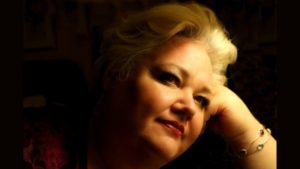
Continuing to Defy Vocal Categorization – Stephanie Blythe Takes on Gianni Schicchi
By Greg WaxbergListeners can refer to her however they wish, but Stephanie Blythe has always resisted categorizing herself as a mezzo-soprano, an alto, a contralto, or any other voice type. In her mind, she is a “vocalist.”
Considering her upcoming appearances at San Diego Opera, her second foray into a role outside her gender, any attempt to categorize her voice will be that much more difficult.
First, there was Don José (as her alter ego Blythely Oratonio) in Chicago Opera Theater’s production of Bizet’s “Carmen.” Now, Blythe will sing the baritone title role of Puccini’s “Gianni Schicchi” for the first time. And to be clear, she is not altering any notes. “I am singing in the baritone range—singing the notes as they were written for a baritone,” she said.
How is this possible—how did she decide that she would start singing roles of a different gender, and how is she reaching these lower notes?
“My voice decided,” Blythe said, quite simply. “I have always had a well-developed low voice, but about five years ago, maybe more, my voice started moving lower and lower, and I’ve worked to develop this lower range. It’s a natural progression because of hormonal changes, and I’ve chosen not to fight it. I chose not to think of my voice as ‘short on top,’ but ‘long on the bottom.’”
This means that her voice has naturally come down to the range required for Gianni Schicchi, giving her the chance to offer a “full-on baritone interpretation.” What’s more—and always needing variety in her repertoire—Blythe is especially excited to sing the title role because she has always wanted to sing it, ever since “Gianni Schicchi” was the first opera she sang in, as Zita (in a production sung in English).
“I have been exposed to some amazing baritones who have sung this role, most especially Alessandro Corbelli,” she said, referring to the new production at The Metropolitan Opera in 2007 and the 2009 revival, in which she sang Zita (Blythe also sang Zita in the most recent Met revival in 2018). “I am very interested in comedy and don’t get to do much of it, and I love this piece because it’s absolutely timeless, probably because the source material is timeless. Dante is timeless.”
Blythe also sees parallels between Zita and Schicchi, “comedic foils, compatriots in age, who are motivated to act by the young people in their lives.” (Lauretta’s famous aria “O mio babbino caro” literally stops the action and manipulates her father’s attitude from inaction to action.) From a purely technical aspect, Blythe is also stunned by Puccini’s achievements in this opera.
“It is such magnificent language and speed—it is fascinating to me that a composer at that age [60] is writing [music that is] that fast. It’s the same thing with Verdi and ‘Falstaff,’ writing music for nine people at a time. The ensemble in ‘Schicchi’ is absolutely perfect. Nothing could be cut from that score.”
That ensemble is concerned with finding a will, and then dealing with what they perceive to be disappointments of the will. Blythe says the title role demands someone who is a listener and a reactor.
“Only someone who truly listens can truly manipulate. He has to diagnose the situation very quickly. What’s difficult is that, because it’s so fast, you have to be on your toes. Schicchi is also an actor, because he is impersonating another person.”
Another plus in Blythe taking on this role for the first time is that she is contributing to the risks that she thinks opera companies need to take to make progress with the art form.
“I admire anyone who presents opera and does something new . . . there is not a single art form that can remain static. It can’t always be the same, but opera and orchestras are more likely to do recreations of old works,” she said. “[My singing Schicchi] is a risk, and I’m grateful to San Diego Opera for giving me this opportunity . . . I’m sure that some people will see it just for the spectacle—and opera is a spectacle, so why not?”
Stephanie Blythe will sing Gianni Schicchi in San Diego Opera’s production of “The Puccini Duo,” a double bill of “Suor Angelica” and “Gianni Schicchi.” She will also sing the Principessa in “Suor Angelica.” Performances begin on February 11.



